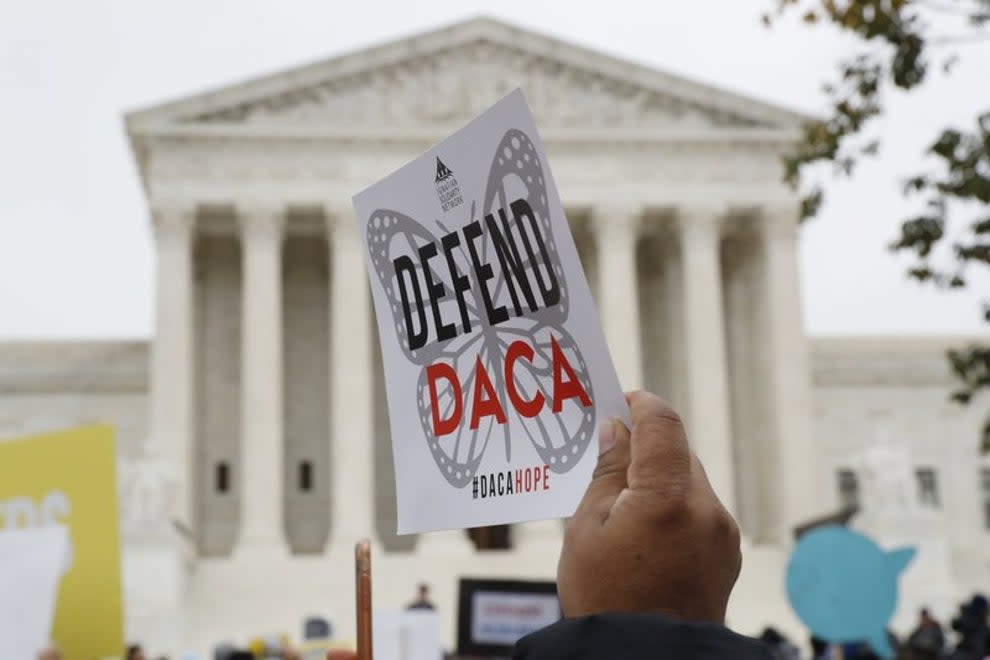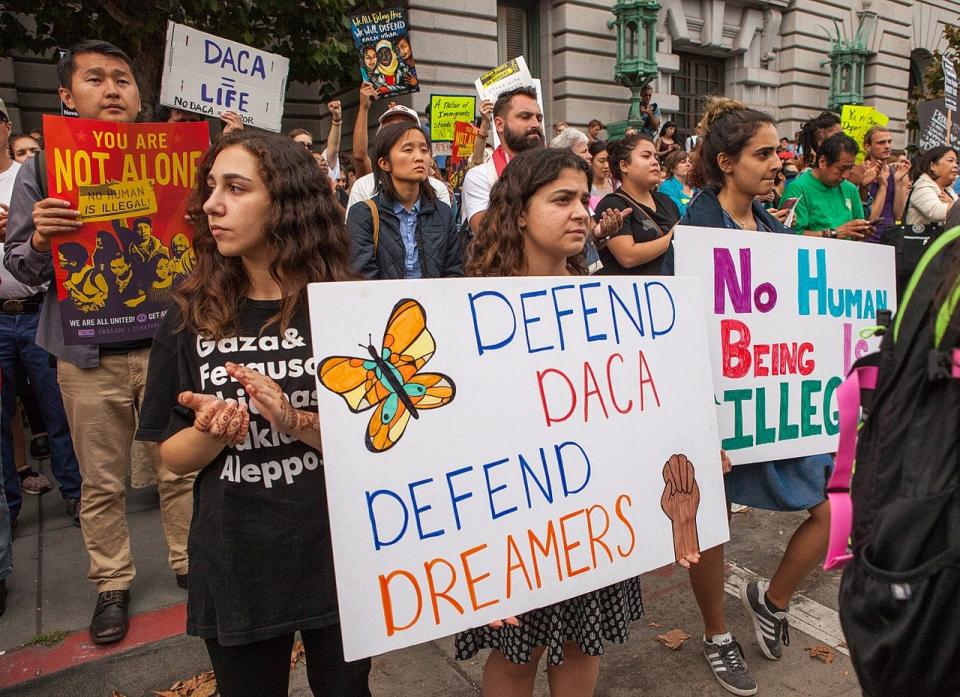DACA: What now?

People rally outside the Supreme Court in November 2019 as oral arguments are heard in the case of President Trump's decision to end the Deferred Action for Childhood Arrivals program.
(AP/Jacquelyn Martin)On the Saturday the news broke that Joe Biden had defeated president Donald Trump, Juliana Macedo do Nascimento felt a momentary sense of relief. As an undocumented person enrolled in the Deferred Action for Childhood Arrivals program (DACA), Macedo had lived in a state of anxiety ever since Trump announced his intention to end the Obama-era program in September of 2017. However, Ms Macedo knew that Mr Biden winning wasn’t enough to save DACA. She also knew that DACA was only a part-way solution. Her sense of relief slowly faded.
With Biden set to enter the White House in January, DACA recipients—often called Dreamers—like Ms Macedo are working to remind people that placing a Democrat in the Oval Office isn’t enough. In the midst of the Biden transition, a conservative federal judge in Texas is hearing arguments in a case that could spell the end of DACA. And even if the program survives that legal challenge, DACA can never be fully “saved.” Because it exists through executive action rather than through an act of Congress, a Republican president could easily end the program within their first months in office if the Democrats lose the White House in 2024.
“It still feels very precarious,” says Ms Macedo, who works as the state and local policy manager for the youth-led immigrant rights group United We Dream.
As DACA has received plentiful media attention in recent years, some advocates worry that the goal line has been shifted: Now, if Mr Biden “saves” DACA, that will feel like progress. But DACA-recipients like Ms Macedo want to make sure the public understands that saving DACA isn’t enough. What the country needs is meaningful immigration reform, passed by Congress, and set into law.
Part of the need for legislation comes from the fundamental precariousness of DACA as an executive program, even with a Democrat in office.While many people only pay attention to DACA when there’s major news, Ms Macedo and other Dreamers are constantly checking in on the status of the program that decides so much of their lives. A month after the election, as others talked about Mr Biden’s Cabinet appointments, Ms Macedo and other DACA recipients remained locked in rapt attention to a court case in Houston. In the Fifth Circuit, the conservative district court judge Andrew Hanen currently has a lawsuit in front of him challenging the constitutionality of DACA, in a case brought on by the attorney general of Texas and eight other states. “Texas has argued for years that the federal executive branch lacks the power to unilaterally grant unlawfully present aliens lawful presence and work authorization,” state attorney general Ken Paxton said in a statement when he introduced the lawsuit in May of 2018.
It’s not a coincidence that Mr Paxton and the other attorneys general filed their suit in the Fifth Circuit, in front of Mr Hanen. Since he was appointed by president George W. Bush in 2002, according to the immigrant rights group America’s Voice, Mr Hanen has done more to undo progressive immigration policy than perhaps any other public official besides Mr Trump. He’s ruled negatively for immigrants on dozens of lawsuits—most famously against “DAPA,” the Deferred Action for Parents of Americans program Barack Obama created along with DACA to protect undocumented people with citizen children.

With this latest suit in front of him, Mr Hanen will have the power to end DACA. With his track record, court watchers predict a negative decision. In the week of Christmas, lawyers supporting DACA pleaded with him to delay making a final decision until Mr Biden took office.
Ms Macedo’s respite from Mr Biden’s victory has been quickly overcome by worry about Mr Hanen’s decision and the future of DACA. That flux, from relief to anxiety, is an ebb and flow the advocate knows well. Ever since she first enrolled in DACA soon after it was created in 2012, Ms Macedo’s life has been characterised by a deep vulnerability to forces out of her control.
First, there’s the nature of DACA itself. The program does not offer recipients a pathway to citizenship or any other sort of permanent status. Instead, it carves out a limbo for people like Ms Macedo: She has a work permit; she can legally drive; and she’s shielded from deportation. However, she can’t apply for citizenship. And, every two years, she has to renew her entire DACA application—a tedious, nerve-racking process that always threatens to end with losing her status.
Then, even outside of the personal uncertainty, DACA has become a generational political battle. Despite the program’s majority support among all voters, including among Republicans, Congressional Republicans have fought DACA since its first days, and, in September of 2017, Mr Trump announced his intent to end the program. DACA recipients like Ms Macedo were horrified, but unsurprised at Mr Trump’s decision. (“Honestly I was just surprised he didn’t try to end it on Day One,” she says.) Fortunately for them, a series of court cases stopped the president from immediately ending the program. For the past three years, as these cases wound their way through the courts, pre-existing recipients like Ms Macedo have still been able to renew their status, but new applicants have not been able to apply. Finally, in June, the Supreme Court ruled that Mr Trump’s attempt to end the program was illegal—but, crucially, only because he didn’t follow the proper administrative process. If Mr Trump had won a second term, he likely could have ultimately ended the program. And now, Judge Hanen might still do that work for him.
Ms Macedo says the state of permanent uncertainty she and other DACA recipients feel is intolerable.
“It’s been a roller coaster ride. From the beginning, it was always a very precarious program—it was challenged from the very beginning,” Ms Macedo says. “The nature of it really takes a toll on people. Every two years, I have to go have my fingerprints taken, and they take my picture. And now, all the challenges and all the threats against DACA have made it very clear that it’s not even close to a perfect solution.”
That’s why DACA recipients say that the future of the program only has one path forward: In Congress.

Juan Escalante
atlweddingphotos.comAccording to Juan Escalante, a DACA recipient and policy strategist for the immigrant advocacy organisation FWD.us, DACA limitations come from the fact that the program was always a “Band-Aid solution” to the failure to accomplish meaningful immigration reform.
“You have to think about how DACA came to be,” Escalante says. “It was largely due to congressional failure to act, and the Obama administration realising they had not delivered on their promise of shoring up immigration reform. So, in 2012, when President Obama stood in the Rose Garden and announced the creation of DACA through executive action, he essentially established that it would be a temporary solution. But we have seen no action from Congress.”
The term “Dreamer” comes from a failed bill. In 2001, the Development, Relief, and Education for Alien Minors Act—otherwise known as the DREAM Act—would’ve provided a path to permanent residency for undocumented immigrants who arrived as children with the parents. The bill failed, and, for the last 20 years, there has been no meaningful legislative action on immigration reform. Recently, the Democrat-controlled House passed a renewed version of the bill, but it was dead on arrival in the Senate.
“We need a concrete solution. Something that is encoded into law.”
–Juan Escalante
“The DREAM Act would have shielded me and over 700,000 other people from deportation,” Mr Escalante says. “We need a concrete solution. Something that is encoded into law.”
Ms Macedo says that she and organisers at United We Dream are working to educate the public that if Biden “saves” DACA, that in-itself would not be meaningful immigration reform.
“What we would like folks to understand is that Trump has done such a good job of lowering the bar,” Ms Macedo says. “Now it will look like progress if we actually move backward to where we were before him.”
For Ms Macedo, that reform has to account for more immigrants than just people in her situation—people who arrived as children. The Migration Policy Institute estimates there are roughly 600,000 current DACA recipients in the country, and as many as 1.3 million people who would be eligible for the program. But there are over 11 million undocumented immigrants in the US. Ms Macedo says that consequential reform must consider all these people. That argument is deeply personal to her as it affects her own family. Her parents, who immigrated with her from Brazil when she was a teenager, do not qualify for DACA, and the whole time she’s been enrolled as a Dreamer, they’ve faced the threat of deportation.
Ms Macedo adds that she doesn’t want relief for Dreamers to become a compromise that leaves people like her parents out.
“You can’t give me a green card and deport my mom and dad,” she says. “That’s not a deal I would even, ever accept.”
With Mr Hanen set to make a decision imminently, Dreamers say Biden must go beyond executive action and introduce a bill in Congress. There’s hope that, after decades of failure, the country is finally ready to make a change on immigration.
For Ms Macedo, that’s the biggest difference she feels in the shift from Trump to Biden.
“We don’t have to just play defense anymore,” she says. “Now we can push for the right solutions for our people.”
Read More
Court case in Texas shows DACA program remains under peril
Judge: DHS head didn't have authority to suspend DACA
Trump puts DACA programme ‘on hold’ despite Supreme Court ruling
Trump tweets falsities about Dreamers as Supreme Court hears DACA case

